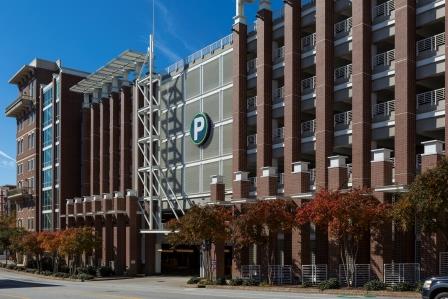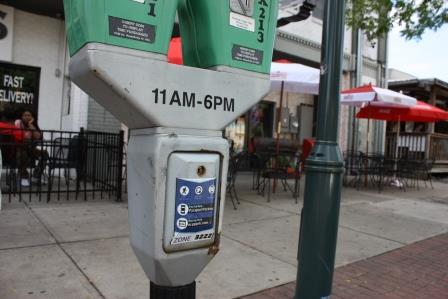The City of North Augusta has plans for a riverfront development that include a baseball stadium, condominiums, retail, restaurants, hotel and convention center, and office space. Increased economic development usually comes with parking concerns. North Augusta officials had to consider the challenges of providing enough parking for events while allowing sufficient parking for restaurants, retail and the hotel.

South Spring Street Garage, Greenville
Downtown parking can have a major impact on businesses and the local economy. Successful parking solutions allow residents and visitors to easily come downtown to shop, dine or play. Many cities are looking at different ways to address their parking needs in an efficient and affordable manner.
For North Augusta, the solution involved building three parking decks, according to City Administrator Todd Glover. "To create a walkable downtown, you must have available parking within a reasonable distance of your central business district. Large quantities of surface parking in a downtown occupy too much valuable land that could be used for a business," he said.
Structured parking is very expensive, ranging from $15,000 to $22,000 per space, Glover said. The most efficient and effective use of any structured parking is to have daytime and nighttime uses for the deck, he said. By moving the location of a planned parking deck about 300 yards up the road, North Augusta was able to leverage that parking to attract the Medac headquarters, an anesthesiology billing company.
"The first of the three decks (the one utilized by Medac) is already having a positive impact on existing businesses and creating a great deal of interest from service-related businesses," Glover said. "It is much easier for those employees to run errands during lunch on foot than to drive out of the deck to another location."
The City of Rock Hill also is in the process of planning a third parking deck to handle the growing demand for parking as development continues downtown.
This new parking deck will be built within existing surface parking areas. The move to structured parking comes with direct impacts on supply and demand, according to David Lawrence, Knowledge Park development manager for the City of Rock Hill.
"As development moves forward, we are adding demand while taking away supply with buildings replacing existing surface parking lots," he said. "Parking decks are not developed in a quick fashion as they are prohibitively expensive. For a 250-space parking structure, the cost to Rock Hill could be about $3.8 million using the construction rate quoted."
The city also has turned to other means to address parking issues.
About two years ago, Rock Hill began using an automated device for parking enforcement. The parking enforcement officer enters a license plate into the handheld system, which references a database of parking violations incurred during the previous two years. Based on the number of times that license plate has been cited in the past, the device will generate a warning or ticket. It is customizable to say how many violations result in a warning, and the amount of fine based on the number of previous violations, Lawrence explained.
With the addition of the first new downtown residential units in decades, Rock Hill officials created a parking license which gives residents reserved parking spaces during off-peak hours (5 p.m. to 8 a.m. Monday to Friday and at all times on the weekend). This license gives residents some certainty that they will find parking after work or when returning for the night, but frees up the parking supply during peak daytime hours, Lawrence said.
The City of Greenville has 10 parking facilities in the downtown area, with two more garages under construction, one garage expansion in the works and two lots in the early stages of construction. Yet the city still faces parking challenges, according to Brittany Moore, utility program marketing coordinator with the Department of Public Works.
One problem is that during weekdays, parking spots are limited in many of the garages due to the amount of monthly parkers and various parking agreements with businesses, Moore said. Another challenge is the public’s ability to identify available parking, especially parking garages.
"Many of our garages do not look like parking garages," she said. "So, we found it beneficial to use pavement markers outside of the garages, along with street banners pointing drivers to nearby parking."
Many cities are finding creative ways to address parking issues.
In an effort to reduce traffic and keep residents active, both the Greenville and Charleston areas have bike-sharing programs, which allow people to check out bicycles at stations around town. The Greenville B-Cycle program is a partnership between Upstate Forever and the Greenville Health System. Charleston’s program offers free bike rentals to College of Charleston students, faculty and staff as a healthy and sustainable way to get around campus and the city.
The City of Columbia launched a new pay-by-phone parking app in late July. The app allows smartphone users to pay online for any of the city’s 5,000 parking spaces.
Columbia Parking Director John Spade said they currently are averaging more than 800 transactions a day with revenues over $1,000 daily. In the future, he said, the program will be expanded to include pre-sales of parking for events at the Convention Center and the University of South Carolina’s Colonial Life Arena.
"We are seeing a reduction in the number of citations written as customers now can pay through the app and not worry about having change. The app relieved the city from having to invest in what would be a very expensive program to purchase and run meters which take credit cards. The city still utilizes SmartCards at all its meters and continues to take coins and tokens," Spade said.
Customers purchase SmartCards loaded with $20, $50, $75, $100 or $150. Once they deplete the original amount, they can add more money to it at the Parking Services Department’s Customer Service Office or at the Pay by Space machines in Columbia’s City Center Garage.
The City of Greenville also has incorporated technology with parking. Earlier this year, the city purchased handheld credit card terminals for use during special event parking. Previously, those wanting to park during special events could only pay with cash. City officials also have found that social media helps significantly in making the public better aware of parking locations and prices.
"Keeping parking relevant and keeping parking in a positive light are important," Moore said.

